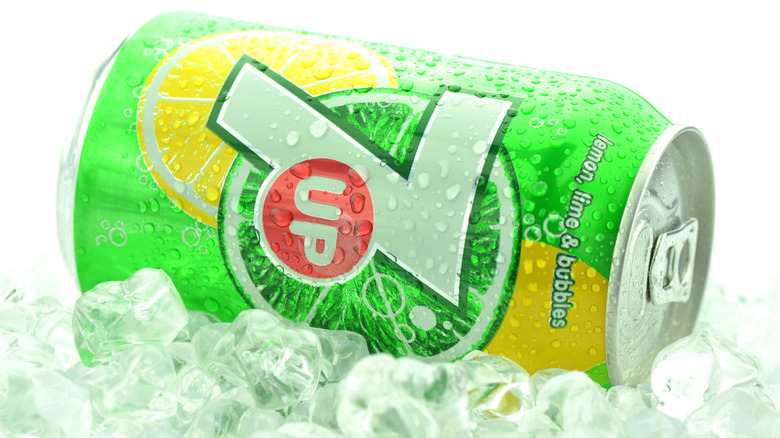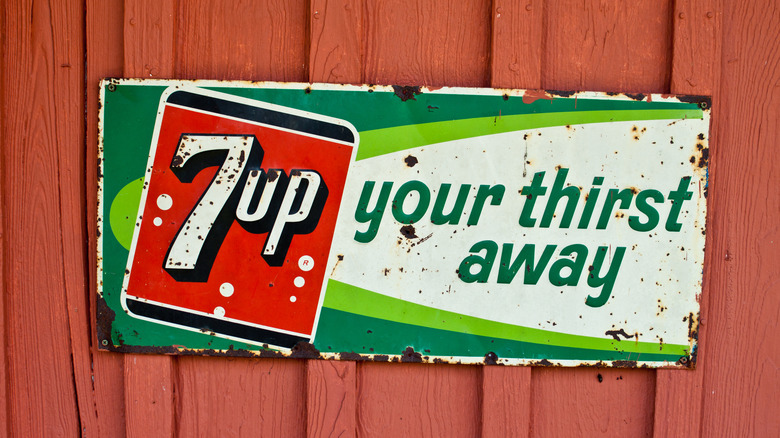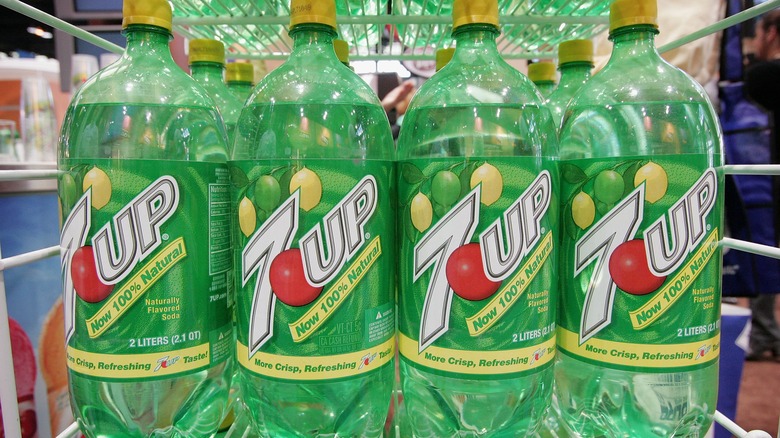The Origin Story Of 7Up Is Likely Different Than You'd Think
In American cuisine, there are several different foods and drinks once purported to have medicinal effects. Salisbury steak may be best known these days as a TV dinner option, but it was actually invented as a way to get Union soldiers to eat more protein during the Civil War. Coca-Cola, which famously contained coca leaf extract (the same plant used to make cocaine), was initially marketed as a morphine-free analgesic alternative. A less well-known story, though, is the (supposedly) medicinal origin of the lemon-lime soda, 7 Up.
When it was first released in 1929, the soft drink was called "Bib-Label Lithiated Lemon-Lime Soda" (catchy, we know). The word "lithiated" referred to the inclusion of lithium citrate, a naturally-occurring chemical compound that was and commonly still is prescribed as a mood stabilizer, particularly for people with bipolar disorder. Lithium was removed from the soda after 1948, when the U.S. Food and Drug Administration banned it as an ingredient in beer and soft drinks. But for about 20 years, the sugary drink included the mood-balancing pharmaceutical. And while there's really no way to know for sure today, the psychiatric effects may well have been what helped the drink gain a foothold in the American soft drink lineup.
7 Up might have eased the Great Depression's sting
As fate would have it, just two weeks after 7 Up's debut, the great stock market crash of 1929 happened, hurtling the U.S. into the Great Depression. The sudden financial ruin following the prosperous 1920s led to banks shuttering, businesses being forced to close, families losing their livelihoods, and many other difficulties that come from economic hardship. Understandably, this catastrophe sparked something of a mental health crisis. 7 Up was advertised as a mood booster, and some historians credit the difficult time for the drink's success — or at least in part, anyway.
It's true that many medications and treatments throughout history came from, essentially, throwing stuff at a wall to see what sticks. But lithium today remains the gold standard of treatment for people with bipolar disorder, and is prescribed for a number of other mood-related disorders as well. Without the actual recipe, it's impossible to determine if there was actually enough lithium in 7 Up to supply an effective dose, but given that lithium has been clinically proven to work, it's entirely possible that consumers did experience some degree of mood-boosting benefits.
7 what, exactly?
Not long after 7 Up's introduction, its name was changed from the "Bib-Label" mouthful to "7Up Lithiated Lemon Soda." In 1936, it was shortened to just 7 Up. The drink's inventor, Charles Leiper Grigg, never publicly revealed the reason behind the "7 Up" name, but there's plenty of speculation. One theory is that the number 7 actually refers to lithium, as the chemical's atomic mass is about 7. But others claim that Griggs won a big poker game on the seventh "up" card he was dealt, or that he was inspired by a particularly memorable cattle brand. This is probably one mystery lost to time.
While you now need to buy your soda and psychiatric medication separately, the (lithium-free) lemon-lime drink is still easy to find around the U.S. and beyond. It's the namesake of the well-known 7 and 7 cocktail, a mixture of 7 Up and Seagram's 7 Crown whiskey, and the key ingredient in 7 Up cake, a light, fluffy, and citrusy take on pound cake. It may not be the chemical pick-me-up it once was, but the taste alone might be enough to lift your spirits.


